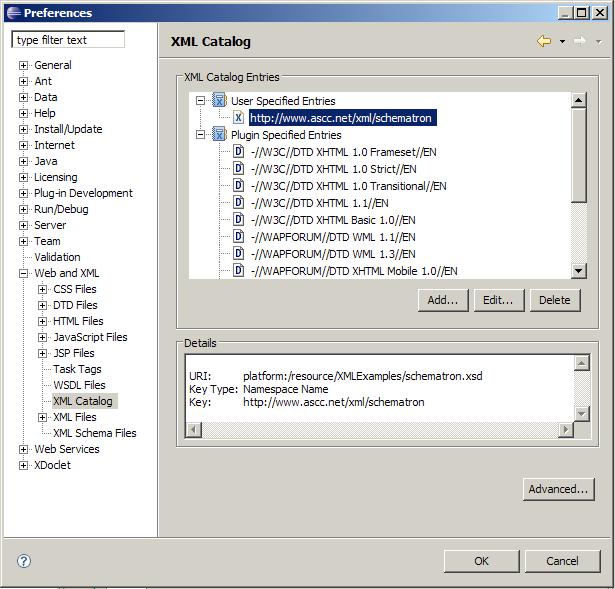Notice: This Wiki is now read only and edits are no longer possible. Please see: https://gitlab.eclipse.org/eclipsefdn/helpdesk/-/wikis/Wiki-shutdown-plan for the plan.
Using the XML Catalog
Note that this document is a work in progress. Various portions are missing and incomplete. See bug 135079 for more info or to provide feedback.
The eclipes WTP project provides support for using an XML Catalog based on the OASIS XML Catalog specification. An XML Catalog provides some limited control over how references to other resources are handled. So for example if a user has one or more XML documents that reference a DTD or XML Schema via a web address (e.g. http://www.example.org/foo.xsd) they can use the XML Catalog to map this address to their own local copy of this resource. This way 'catalog aware' tools won't need to go off to the internet to fetch the resource. There's several other ways an XML Catalog can be used as defined by the OASIS XML Catalog specification. If you're an eclipse plugin developer there's also some convenient extension points you can utilize to contribute to the XML Catalog settings.
Editing the XML Catalog Settings
The XML Catalog (as shown in the figure below) can be accessed via the Eclipse preferences as follows...
1. Select “Window -> Preferences” to launch the Preferences dialog.
2. In the navigation tree expand the “Web and XML” group and select “XML Catalog”.
Working With DTDs
If you're working with XML documents that contain 'DOCTYPE' declarations to reference DTD resources you can control how the referenced DTD documents are located. If an XML document utlizes a DOCTYPE declaration that specifies a PUBLIC ID (as shown below) you can use the XML Catalog to register a local DTD file using the PUBLIC ID as the key.
<!DOCTYPE Invoice PUBLIC "-//EXAMPLE//DTD INVOICE//EN" "http://www.example.org/Invoice.dtd">
If an XML document utlizes a DOCTYPE declaration that specifies a SYSTEM ID (as shown below) you can use the XML Catalog to register a local DTD file using the SYSTEM ID as the key.
<!DOCTYPE Invoice SYSTEM "http://www.example.org/Invoice.dtd">
Hint : If you examine the XML Catalog setting in WTP you'll notice that there's several DTD related entries that specify a PUBLIC ID key.
Note : If your XML document utlizes a DOCTYPE declaration (as shown below) that specifies a relative URI location (e.g. 'Invoice.dtd' as opposed to a fully qualified URI) then a DTD can NOT be registered using "Invoice.dtd" as the System Id key. TODO.. reference section below that describes why this is the case and how XML Catalog v1.1 provides a way to partially solve this.
<!DOCTYPE Invoice SYSTEM "Invoice.dtd">
TODO... describe how to working DTD's that reference DTDs work the same way
Working With XML Schemas
XML instance document can be associated with XML Schemas in two ways. The first way involves explicit location attributes specified directly in the XML document that specify a URI location to the XML Schema. The second way involves an implicit association between an XML namespace and an XML Schema (where this association is stored outside of the XML document).
Often XML documents are designed as shown below (in partial form) where schema locations are explicitly specified using 'xsi:schemaLocation' or 'xsi:noNamespaceSchemaLocation' attributes. In these cases you can use the XML Catalog to register a local XML Schema file using the Schema Location as the key. This way a reference to web resource (e.g. http://www.example.org/foo/schemas/foo.xsd) can be redirected to a local resource.
<xyz:foo xmln:xyz="http://www.example.org/foo/" xsi:schemaLocation="http://www.example.org/foo/ http://www.example.org/foo/schemas/foo.xsd" ... <foo xsi:noNamespaceSchemaLocation="http://www.example.org/foo/schemas/foo.xsd" ...
As you can see from the code snippets above explict schema locations involve some ugly syntax and are hard to read (especially when multipe namespaces and schemas are used in the same XML document). The Eclipse WTP XML Catalog allows you to associate an XML Schema with a given namespace key. That way your development tools can provide schema aware function (such as validation, code assist, etc.) without requiring you to add ugly schema locations into your XML instance documents.
<xyz:foo xmln:xyz="http://www.example.org/foo/">
Hint : If you examine the XML Catalog settings in WTP you'll notice that there's several XML Schema related entries that specify a Namespace Name key.
Note : If your XML document utlizes explicit schema locations these locations will take precendence over any XML Schemas associated with this particular namespace.
Note : If your XML document specificed relative schema locations (e.g. 'foo.xsd' as show below) then an XML Schema can NOT be registered using "foo.xsd" as the Schema Location key. TODO.. reference section below that describes why this is the case and how XML Catalog v1.1 provides a way to partially solve this.
<xyz:foo xmln:xyz="http://www.example.org/foo/" xsi:schemaLocation="foo.xsd" ...
FAQ
- I've registered a DTD with a 'System ID' key of 'foo.dtd' and it doesn't work. Why not?
Locations in an XML instance get expanded _before_ the XML Catalog is referenced. So the XML Catalog should contain only fully qualified URIs (e.g. http://www.example.org/foo.dtd). - I've registered an XML Schema with a 'Schema Location' key of 'foo.xsd' and it doesn't work. Why not?
Locations in an XML instance get expanded _before_ the XML Catalog is referenced. So the XML Catalog should contain only fully qualified URIs (e.g. http://www.example.org/foo.xsd). - I've registered my DTD or XML Schema but eclipse is still going off to the internet to fetch a resource. Why?
The registested DTD and XML Schema may have references to more DTDs and XML Schemas. - I've registered an XML Schema by namespace but XML files are still using the 'xsi:schemaLocation' value. Why?
An explicitly specified schema location value takes precedence over XML Catalog entries that are keyed by namespace. - Can I register multiple XML Schemas for the same namespace?
No you can't. There should be only one XML Schema registered for a given namespace.
OASIS XML Catalog specification
OASIS XML Catalog V1.1 specification
XML Catalog Tutorial

